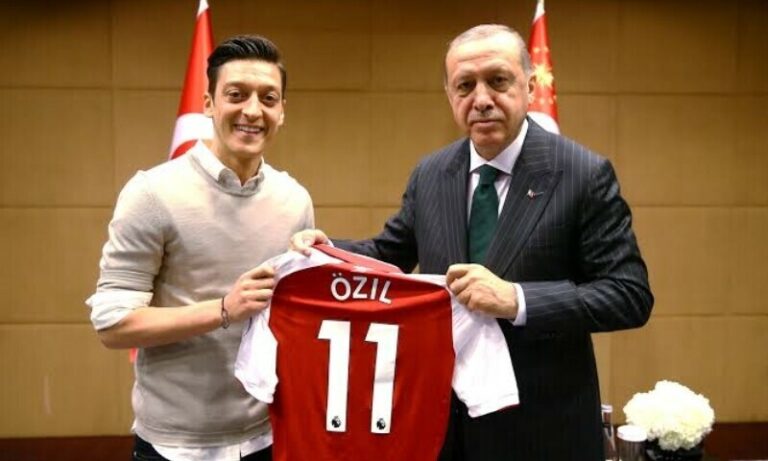Former Germany, Real Madrid, and Arsenal star Mesut Ozil, who retired from professional football in 2023, has now entered the political arena. On Sunday, he was elected to the ruling Justice and Development Party (AKP) of Turkish President Recep Tayyip Erdogan, the party confirmed.
The 2014 World Cup winner, born in Germany to Turkish parents, became a member of the AKP’s central council at a major party congress in Ankara. The event also saw Erdogan re-elected as the head of the conservative party for the ninth time, continuing its dominance in Turkish politics since 2002.
A Longtime Erdogan Supporter
Ozil has been a vocal supporter of Erdogan for years. His ties to the Turkish president gained widespread attention when he invited Erdogan to be the best man at his wedding in 2019 to Amine Gülşe, a former Miss Turkey. This move, however, was met with criticism in Germany, where Ozil had long been seen as a symbol of multicultural integration.
His close association with Erdogan had already sparked controversy in 2018 when Ozil and fellow German international Ilkay Gündogan, both of Turkish descent, posed for a photograph with the Turkish leader. The image caused outrage in Germany, with many questioning Ozil’s loyalty to his birth nation. The German government accused Erdogan of authoritarianism, while far-right groups in Germany criticized Ozil for aligning himself with the Turkish president.
Fallout with the German National Team
Once celebrated as an emblem of Germany’s successful multiculturalism, Ozil’s relationship with the country’s football establishment soured following the Erdogan photo controversy. Amid backlash from fans, media, and political figures, Ozil felt abandoned by the German Football Association (DFB).
After months of silence, he finally responded in an explosive four-page statement, where he accused the DFB of racism and failing to support him against his critics. He specifically pointed fingers at then-DFB president Reinhard Grindel, whom he accused of discrimination and hypocrisy.
“In the eyes of Grindel and his supporters, I am German when we win, but I am an immigrant when we lose,” Ozil wrote, expressing frustration over how he was treated differently based on results.
Feeling alienated, Ozil announced his retirement from international football in 2018 at just 29 years old, stating that he no longer felt welcome in the national team. His departure from the Mannschaft was a defining moment in German football, raising questions about diversity, integration, and national identity in sports.
A New Chapter in Politics
Following his controversial exit from international football, Ozil’s club career saw him move to Fenerbahçe in Turkey before finishing his playing days with Istanbul Basaksehir. His transition into Turkish politics now cements his alignment with Erdogan and the AKP.
As a member of the party’s central council, Ozil will likely play a role in shaping political strategies and engaging with the Turkish public. While his exact duties remain unclear, his popularity among Turkish youth and football fans could be an asset for the AKP as it looks to maintain its grip on power.
Ozil’s journey—from a football superstar to a politically active figure—has been marked by both admiration and controversy. His latest move into politics is yet another chapter in his eventful career, and it remains to be seen how his influence will shape his future in Turkey.


